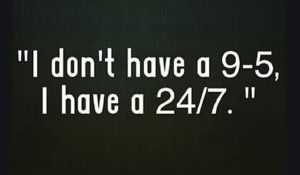Think Pieces
‘Saying YES to one thing means saying NO to another’. How are your boundaries?

Following a productive zoom meeting this week, during which the timer ended far before the enthusiasm, creativity and discussion, Nicki Smith, Lead Facilitator and an OLEVI Professional Coach, reflected on how her boundaries are being challenged at the moment, and the opportunity for her, and us, to learn and grow.
After a month of lockdown, the blurring of boundaries has increased and I wanted to reflect on this quote by Sean Covey because saying ‘yes’ or ‘no’ often is not a conscious decision or explicit action and it is frequently the case that we don’t even realise what we are doing or having more or less of as a result.
‘Yes or no is often not a conscious decision or explicit action …’
What am I Learning about Boundaries with Time?
‘After years of wanting to thoroughly clean my house but lacking the time, this week I discovered this wasn’t the reason’.
I was sent this in a meme and it absolutely resonated, both on a personal and professional level. The prospect of remote learning was initially exciting as ‘not enough time’ has been my biggest barrier to doing things in a way that I choose and many of our usual ‘time thieves’ seemed to have been removed. It quickly became apparent that these were simply replaced with different and even more time-consuming activities. The removal of the school bell and the strict 10 minute windows within which I can grab a cup of coffee and snack, address a variety of student issues and sometimes even sprint to the toilet has provided an insight into a life which is less tightly compartmentalised.
However, the shift for many to multi-tasking remote learning, rotas in school, home schooling, illness, responsibility for others in our communities and the vast expansion of our professional roles has been overwhelming. This removal of external controls on our time has opened up a huge opportunity for us to learn more about how to balance and organise this, prioritise commitments and redefine a schedule that works for us.
 The Pareto Principle of 80/20 suggests that 80% of outcomes and results actually come from 20% of input, action and effort. I have been trying to take this into account after many realisations that hours have passed online after falling into a vortex of exploring various ways to plan a lesson and I have been thinking about how to work smarter and not harder.
The Pareto Principle of 80/20 suggests that 80% of outcomes and results actually come from 20% of input, action and effort. I have been trying to take this into account after many realisations that hours have passed online after falling into a vortex of exploring various ways to plan a lesson and I have been thinking about how to work smarter and not harder.
What questions am I asking myself? Who are we giving the control and power to over how our time is spent? What do we want to prioritise in terms of how we spend our time? What is the lack of external control over time teaching our students and us about independence, responsibility and motivation? Where are we disregarding the finite limits inherent in time? What 20% of our actions are the ones making an impact and how can we eliminate some of the rest? If as Annie Dillard says “How we spend our days is, of course, how we spend our lives.” Then, how are we spending ours?
What am I Learning about Boundaries with Work/Life Balance?
This week I finally succumbed to Mike’s request to subscribe to Netflix and must confess that we have become strangely addicted to the Tiger King. Amongst the many shocking and unexpected twists there were a few scenes which reminded me of school. Many of the employees spoke of ‘working’ 8am-12pm shifts, with few breaks, claiming that it was a lifestyle or vocation rather than a job and one even returned to work just 7 days after having their arm bitten off by a tiger. In a strange way I saw parallels to many educational contexts and the sacrifices of those within them. Some argue ‘Do what you love, and you’ll never work another day in your life’ but the reality is that many of us spend longer than we ‘should’ or that our families may want us to on work.

Although this is because we care deeply about our students and often put their needs above our own, there may be some non-negotiable wants and needs for ourselves that we are sacrificing which would help us to make things more sustainable. Having time and energy is especially important for our own mental and physical well-being given the unknown period before the situation shifts again, as well as the unknown shape that this will take.
Those in business often talk about ‘managing expectations’ and there is the concept of our responsibility to communicate the degree to which we are working or accessible 24/7 during this current situation with both our words and actions to colleagues, students and parents.
What questions am I asking myself? If OFSTED did a ‘deep dive’ into how we spend our time, how would our self-audit compare to the vision, stakeholder perception and their observed reality? Which rituals are helpful to mark a clear start and end to the working day? What are we modelling to our students and those we lead about work/life balance? How mindful are we being about our own professional and personal boundaries?
So, if ‘saying ‘yes’ to one thing means saying ‘no’ to another’ then what do you want more of and less of at the moment? How are your boundaries?
